Your Cart is Empty
~ Waiting List in Operation ~ Please Ask Before Ordering ~
~ Personalised jewellery to treasure forever ~
~ Waiting List in Operation ~ Please Ask Before Ordering ~
~ Personalised jewellery to treasure forever ~

The Origin of New Year’s Resolutions
January 02, 2019 3 min read
“New year, New me!”
Wow, I’ve heard that before. You probably have too. Whether it’s getting into shape, drinking less alcohol or doing better at work, huge numbers of people use the New Year as a chance to make resolutions for the year ahead.
I’ll admit that whereas I throw myself into Christmas, I’m a little bar humbug about New Year and resolutions. I struggle to see how waking up on the 1st of January, is any different to waking up on the 31st of December. What exactly changes?
On the other hand, the idea that you can start over fresh once a year is definitely an attractive one.
The New Year’s Resolutions we make are a very personal affair, chosen because we think they can improve our lives in one way or another, but history tells us that this hasn’t always been the case.
Ancient times
The concept of a New Year’s Resolution dates back to ancient times, when civilisations such as the Mesopotamians would celebrate the start of a new year with a sacrifice and promises to the gods.
In fact, New Year’s resolutions (or the forerunners to them) existed at least 4,000 years ago.
We know this because the ancient Babylonians recorded them. They made promises to the gods and pledged loyalty to their king, believing that if they kept their word, the gods would reward themwith favour for the year.
Today, we don’t make promises to the gods. But we do make promises to ourselves.
The modern tradition can be dated back to Roman times, when at the beginning of the new year, the Romans would promise to be good and offer a sacrifice. The resolutions made in Rome were more personal than the Babylonian’s.
But it still doesn’t quite match up to our super-modern resolutions. I, for one, highly doubt a Roman soldier ever made a resolution that they’ll lose a bit of weight!
And so, we have a break in history where modern resolutions first came to be. Thankfully, we can trace this back to the Methodist Church, circa 1740.
John Wesley, founder of Methodism, created a Service held on New Year’s Eve. The service was traditional and was used as a platform to look back on mistakes made during the year and resolve them.
Modern-day resolutions
Despite their ancient and religious origins, resolutions today, are now a largely secular practice. And people do tend to make them for personal, not religious reasons.
They’ve also become somewhat of a marketing platform for retailers to peddle stuff. Gym memberships for getting into shape, non-alcoholic beer, experience days - you get the idea.
Losing weight, drinking less, seeing family more often, earning more money, eating more healthily, being more considerate to others - all these are popular modern resolutions. But which are the most popular and common? Here’s a complete list of the top 10:
1. Exercise more
2. Lose weight
3. Stop smoking
4. Eat more healthily
5. Drink less alcohol
6. Learn something new
7. Find a new hobby or pastime
8. Be more considerate to others
9. Spend more time with family and friends
10. Make the most of life – live for the moment
However, despite our good intentions, it’s estimated that out of every resolution made, a whopping 80% of those promises fail as early as half way through January or the beginning of February.
Maybe it’s the lack of sacrificing things to the Gods these days. Less Pressure!
So what could we all do instead? After all, resolutions are usually about self-improvement and that can never be a bad thing.
Rather than making general, sweeping, life changing resolutions, people who set themselves mini goals, on a regular basis, seem to be a lot more successful when it comes to accomplishing them.
Maybe as part of a long term plan, maybe not.
No fictitious deadline dates that make them feel all stressed and disappointed when life gets in the way, just small buildable tasks, completed one after another, whenever they can.
It beats procrastination, feels a lot more achievable and most importantly, seems to actually get things done.
Sometimes, it helps to have a few crutches to help along the way. Regular magazines to buy that contain some inspiration; online course sites like Skillshare with mini lessons that can be completed in less than an hour; regularly checking in to Facebook groups with likeminded people. Little things to help us stay on track.
At the end of the day, as you’re achieving something and heading in the right general direction, the mini failures don’t matter and it doesn’t matter how long it takes.
It’s a long year. And after all, you can always start again next New Year.
Leave a comment
Comments will be approved before showing up.
Subscribe
Sign up to get the latest on sales, new releases and more …

Join the Club
WE'RE SO PLEASED TO SEE YOU!
Stay a while and look around.
While you're here, why not subscribe to our newsletter?We'll give you £20 off your first order, VIP access to new products, and access to our very special sample sales.We promise not to annoy you (honest).
